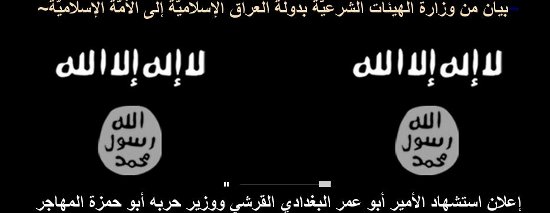|
|
|
The banner from al Qaeda in Iraq announcing the deaths of Abu Ayyub al Masri, the leader of al Qaeda in Iraq, and Abu Omar al Baghdadi, the leader of the Islamic State of Iraq, al Qaeda’s political front. |
Al Qaeda in Iraq has confirmed that its top two leaders were killed during a raid last weekend by Iraqi and US forces.
The terror group admitted that Abu Ayyub al Masri, the leader of al Qaeda in Iraq, and Abu Omar al Baghdadi, the leader of the Islamic State of Iraq, al Qaeda’s political front, were killed. The Islamic State of Iraq released a statement on the Internet, which was posted on allied jihadist websites. Abu al Walid Abd al Wahhab al Mashadani, the group’s sharia minister, is quoted and confirmed their deaths.
“The ISI Sharia Minister, Abu al-Walid Abd al Wahhab al Mashadani, informed that both leaders were attending a meeting when enemy forces engaged them in battle and launched an airstrike on their location,” the statement, which was translated by the SITE Intelligence Group, said.
Al Masri, Baghdadi, Baghdadi’s son, and an aide to al Masri were all killed by Iraqi and US forces during a raid on their hideout near Tikrit in the remote Thar Thar region on April 18. During the operation, 16 aides and bodyguards were captured.
Al Qaeda in Iraq remained silent about al Masri and Baghdadi’s deaths for six days before confirming the news. In the interim, jihadis posting on the al Qaeda-linked forums doubted Western and Iraqi reports of the deaths of al Masri and Baghdadi. Posts on the forums attempting to lionize al Masri and Baghdadi were removed by administrators. These actions in turn caused many forum posters and members of the media to question the accuracy of the reports that al Masri and Baghdadi had been killed.
Iraqi and US forces quickly capitalized on intelligence gathered from the strike that killed al Masri and Baghdadi. Within five days of killing al Qaeda’s top two leaders, Iraqi and US forces killed al Qaeda’s military commander in northern Iraq and its operations commander in Anbar province.
Al Qaeda followed al Masri and Baghdad’s deaths by killing 67 Iraqis in bombings in Baghdad and Anbar on April 23. Mashadani appears to take credit for the attack, and others like it.
“He said that the ‘Crusaders’ and Shi’ites will exploit the incident to improve the image of Iraqi security services and give the enemy alliance an ‘illusory’ victory after the mass-casualty incidents carried out by the ISI [Islamic State of Iraq] in Baghdad,” al Qaeda’s statement read.









7 Comments
All right, so how many are even left?
I wondered whether they would confirm the deaths, or play loose with the facts and try to keep the ghosts of these two leaders alive for a while. Recent attempts to cover up leadership deaths in Pakistan have in the end looked disorganized and foolish. Maybe they have wised up. This late in the game, keeping ghosts alive serves little in the way of propaganda purposes and tends to undermine credibility. Earlier in the war, there was an aura of invincibility to be maintained, so covering up key deaths made more sense.
We’ve seen that AQI is persistent and dedicated, but they have to feel the hot breath of imminent capture or death both collectively and individually. Not saying that some other insurgency won’t bubble up in that complex ethnic cauldron as they work out their political infancy (or that the last remnants cant cause some mindless carnage) but I sense that this unctuous flavor of Wahabbist evil has been largely neutered in that state.
It’s probably the one thing all Iraqis can agree upon: AQI is persona non grata.
The Iraqis (nor should we) become overconfident over these development. No doubt though, this is indeed a positive development.
One may wish that they would frame it as not “the end” of Al Queda in Iraq, but instead as “the beginning of the end” of Al Queda in Iraq.
Clearly, the momentum in now on the side of the legit Iraqis. Let’s hope that they take full advantage of it and seize the initiative.
As a matter of fact, might Al Queda’s admission of the deaths of those 2 leaders be an attempt of psychological warfare to goad the Iraqis into a false sense of security and complacency?
Let’s hope not. If it is, let’s hope and encourage the Iraqis not to fall for it or let down their guard.
The fact that they are even alive to confirm their leaders’ deaths needs to be taken care of as well.
The Iraqis (nor should we) become overconfident over these development. No doubt though, this is indeed a positive development.
One may wish that they would frame it as not “the end” of Al Queda in Iraq, but instead as “the beginning of the end” of Al Queda in Iraq.
I agree with that.
@James. I would recommend watching a short eight minute interview with General Odierno that is currently up at http://www.pentagonchannel.mil . He seems guardedly optimistic that the Iraqis will build on the gains we’ve/they’ve made there. The very end of the interview is particularly noteworthy.